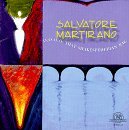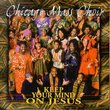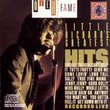| All Artists: Salvatore Martirano, Marilyn Nonken, Vicki Ray, J.B. Floyd Title: Salvatore Martirano: That Shakespeherian Rag, etc. Members Wishing: 0 Total Copies: 0 Label: New World Records Release Date: 5/26/1998 Genres: Pop, Classical Styles: Vocal Pop, Opera & Classical Vocal, Chamber Music, Historical Periods, Modern, 20th, & 21st Century, Symphonies Number of Discs: 1 SwapaCD Credits: 1 UPCs: 093228053521, 093228053521 |
Search - Salvatore Martirano, Marilyn Nonken, Vicki Ray :: Salvatore Martirano: That Shakespeherian Rag, etc.
 | Salvatore Martirano, Marilyn Nonken, Vicki Ray Salvatore Martirano: That Shakespeherian Rag, etc. Genres: Pop, Classical |
Larger Image |
CD DetailsSimilarly Requested CDs
|
CD ReviewsAlmost amazing jive rhapsodist | NYC, NY United States | 01/13/2008 (4 out of 5 stars) "One of the basest of base canards of our time is the idea that in the '60's and '70's there was "one accepted way to compose". In fact, the amount of diversity on that scene was quite possibly far greater than now. There was a certain "public face" of New Music, represented by what we now call Academic Serialism. But on the fringes of this scene there were many mavericks, one of the most beloved of whom was Salvatore Martirano. Genres crash and burn in his music, with varying levels of success. In one sense, one could see him as a kind of Zorn Avant La Lettre. But what keeps him from being so is the commitment to a kind of Schoenbergian melos behind all of his crazy Jazzy gestures. This certainly functions as a unifying element, but not always a very exciting one. For example, I feel that it turns the intermittently thrilling Shakespeherian Rag into a period piece - a kind of Survivor From Warsaw with jokes. Ballad is pretty audacious and amazing - it reminds us that the Jazz paradigm used to be so much more important to the loosening of ties in the free-floating "modern classical" piece than now, when, if I hear one more whippersnapper Trained Young Composer namecheck Bjork or Radiohead, I'm gonna do something violent...Rock is the new Jazz for the Trained Young Composer. Better? Worse? The Same? But I digress...
I can't get very excited by Cocktail Music, although it's got its moments... Octet searches for a kind of freedom that wasn't yet there to find. "Jazz/Classical" remained an implacable binary division, and that Third Thing (what to call it, still?) remained to be born. We know it wouldn't have been born without Cage and Kagel and the AACM and etc. But one also might have to say that composers like Martiriano and Ed London had something to do with its being born as well! Again, therefore, Octet is a very attractive period piece. I'll skip over those cummings songs - THIS I'll admit every composer of the 60's and 70's had to do - write arty art songs that didn't illuminate a whole lot. Stuck On Stella is fascinating, frustrating, problematic. Language is trying to emerge out of the primordial ooze - teleologically one experiences nacent "Post - Modernism". But Post-Modernism that still wasn't quite sure how to speak its name...maybe Frederick Rzewski should perform it, and that would clarify something. Anyway, it's definitely a piece that should be studied on a line that goes to People United (yes, I know this was written AFTER that piece...but Martirano is stylistically slightly "earlier") and further on to Carny - and beyond? (And where do the Ligeti etudes fit into all of this?). Verdict? Martirano was a lover AND a fighter, but maybe not quite a master. Harsh? Sorry...gotta call 'em as I see (or hear) 'em." |




